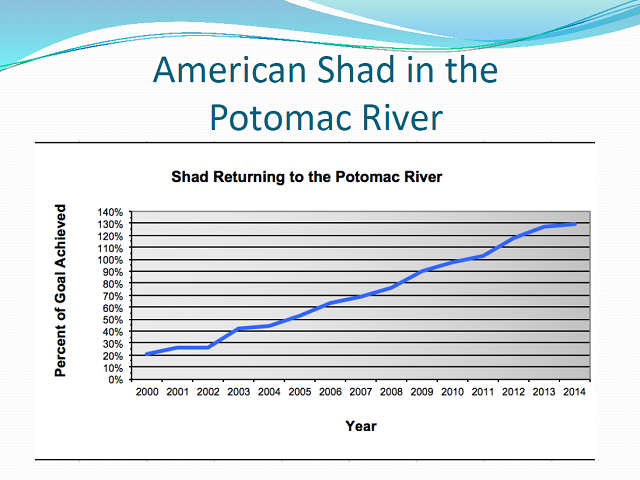National Harbor in Prince George’s County continues to expand. Plans are underway to “reinvent” the waterfront in Old Town Alexandria. And just this fall, the ribbon was cut on a new river-side destination in the District, Wharf DC. These are just a few examples of the power—the draw—of water in metropolitan Washington.
Each of these centers of activity boast residences, restaurants, shops, and venues. They also have the potential to create jobs and generate tax revenue.
“Water is magic,” explains Michael Stevens, President of the Capitol Riverfront Business Improvement District (BID). He is seeing the same enchanting effect along the Anacostia River, thanks to the coordinated efforts of local governments and water utilities to clean up area waterways.
Water is Magic
Michael Stevens, Capitol Riverfront BID President, speaks about the value of a cleaner Anacostia at a recent COG Chesapeake Bay and Water Resources Policy Committee meeting on the ties between water quality and the local economy.
The Anacostia River has grappled with ecological challenges since the late 1800s. However, over the last 20 years the river has begun to show improvement by many measures, from water clarity to vegetation. Residents, businesses, and developers are taking notice.
“We were overlooked for decades, and part of that was because of the cleanliness of the Anacostia,” said Stevens.
According to Stevens, a cleaner, more accessible river has helped the surrounding neighborhood achieve a family-friendly vibe, is a selling point for property owners and buyers, and fosters a sense of identity, place, and community.
The rediscovery of the Capitol Riverfront that began with the Yards Park Project and Nationals Park in the early 2000s has spiraled today into 37.5 million square feet of development, 30,000 residents, 55,000 daytime employees, 10 acres of parkland, two stadiums, and millions of dollars in new sales, property, and income taxes.
“The real estate value of cleaning up the river will bear fruit for years to come,” said Stevens. He estimated that $2.3 billion in public investment will leverage approximately $10 billion in private projects and investments in the Capitol Riverfront.
One of those cleanup efforts is DC Water’s Clean Rivers Project. This system of new, massive tunnels will capture sewage and divert it to the Blue Plains Advanced Wastewater Treatment Plant. The sewage previously overflowed into the Anacostia during rainstorms.
“I can’t wait to introduce a whole new generation to the river,” said Stevens.
Benefits to the Area Seafood Industry
The area seafood industry, which harvests shad, bass, oysters, crabs, menhaden, and blue catfish from area waters, is also benefiting from a healthier Bay and watershed.
Martin Gary works alongside the seafood industry in his role as Potomac River Fisheries Commission Executive Secretary. According to Gary, one marker of the region’s water quality progress is the restoration of the American shad to the area, most notably in the Potomac. The shad is an important link in the Chesapeake Bay food cycle.

Restoration of the American shad to the Potomac (Potomac River Fisheries Commission).
To be prosperous, the industry needs waters that are not nutrient over-enriched, “and our work together is slowly, steadily working,” recognizes Gary.
The fishing industry pulls in thousands of pounds of product a year in the region. Just last year, nearly 520,000 pounds of striped bass were harvested from the Potomac. Area business owners, like Greg Casten of Profish, are now making it a priority to give something back to the rivers they fish. Casten’s premier seafood company serves up fresh local seafood to the Senate, the Smithsonian Institution, and others in metropolitan Washington. He has been making “environment-motivated improvements” to his business as it has grown. From hiring a Director of Sustainability, to eliminating styrofoam and working toward a zero-waste facility, to harvesting invasive species, Casten is working to establish a reputation of being "environmentally responsible and focused on corporate responsibility.”
Most of the water quality progress in the Potomac, Anacostia, and ultimately the Chesapeake Bay has been the result of significant investments and actions by area governments and utilities. It is also the key focus of COG’s Chesapeake Bay and Water Resources Policy Committee, which most recently brought together officials and business leaders to consider the connection between water quality and the health of the economy.
Sparking a New Industry
Innovative, vigorous stormwater management projects are helping Prince George’s County meet its water quality commitments, while at the same time creating local jobs and sparking a whole new green infrastructure industry.
The county launched a 30 year public-private partnership, known as the Clean Water Partnership, to retrofit impervious surfaces and add new green infrastructure. Now in its third year, the partnership is also committed to strengthening and developing the water sector workforce in the county.
Local and minority-owned businesses are being tapped for the work that needs to be done. Contractors are being mentored and trained to increase their capacity in green infrastructure construction. Several semesters of stormwater management courses have also been offered at Prince George’s Community College.
“Building rain gardens can clean water, beautify neighborhoods, and also employ 20-plus people,” says Adam Ortiz, Director for the Department of the Environment for Prince George's County. “Everything is interconnected.”
MORE: Local contributions to Bay progress highlighted at Water Quality Forum